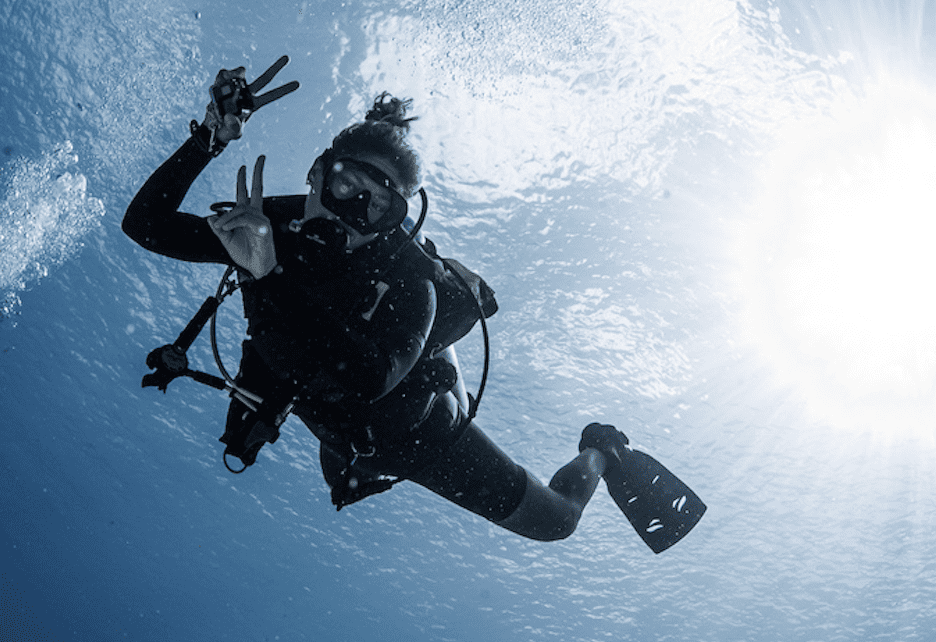Listen up, fellow divers! We are privileged to explore the fascinating and mysterious underwater world. It’s a world of breathtaking beauty and awe-inspiring creatures, and it’s important that we do our part to preserve and protect it.
Let’s talk about scuba diving etiquette and best practices.
We’ve got some do’s and don’ts to keep in mind, and it’s all about being courteous and safe while diving,
Scuba Diving Etiquette
Do: Start off well
First off, you want to give yourself plenty of time to arrive at your dive site and prepare. To be early is to be on time, and to be on time is to be late, as they say.
A lot of dive operators follow a strict boat schedule, and you don’t want to be left behind if the charter leaves without you on it.
Aim to arrive 15 minutes early to avoid rushing and accidents, and to ensure you can relax and enjoy the dive.
Do: Listen to the Dive Briefing
Even if you’ve been to the dive site 100 times, don’t talk during the briefing. Even if you’re a dive pro, others may not be. Show some respect by keeping quiet and letting everyone get the info they need.
Also, be open-minded about the dive site. Weather conditions or the skill level of your buddies may affect the choice of location. Respect the recommendations of your guides and avoid pushing for a risky site.
Do: Seek Proper Training
Diving may seem like a breeze, but trust me, it’s not just about looking cool in a wetsuit and flippers! It’s a whole new world down there, and it’s crucial to get proper training from a certified diving agency. While diving may seem easy and thrilling, it can be incredibly dangerous without the right training, from a certified agency such as PADI or SSI. It’s essential to understand that diving involves specific skills, knowledge, and techniques that require professional instruction to ensure safety underwater.
Certified diving agencies, like DivePoint, offer comprehensive training that covers everything from handling equipment and planning dives to underwater communication, buoyancy control, and emergency procedures. Plus, they help you to avoid the risks of decompression sickness, lung overexpansion injuries, drowning, and more. They’ve got standards and guidelines that keep you in line with international diving regulations, so you’re well-prepared to handle any underwater situation like a pro.
Moreover, obtaining proper certification not only enhances your skills as a diver but also provides you with a recognized credential that is globally accepted. It shows you’re committed to safe diving practices and not just some clueless fish flapping around in the water.
Safety first, folks!

Don’t: Use Tanks To Blast Dust Caps
Picture this: you’re at the dive site, minding your own business, when suddenly you hear a blast of air coming from someone’s tank. You look over, and there they are, a diver, using the gas to clear excess water off their dust cap. But let me tell you, it’s just a pointless and loud habit that’s probably causing more harm than good.
I can tell you that this method of drying dust caps is about as effective as blowing on them or using a towel. But it’s annoying because it’s exponentially louder and completely unnecessary.
That sound can startle anyone nearby and be harmful to the ears. Not to mention it’s a major distraction for dive guides, boat crew, and captains who need to stay focused on keeping everyone safe.
These professionals are like the guardians of the deep, right? But when they hear that gas hissing out of a tank, it’s like a big red flag waving in their faces. They need to drop everything and deal with it as it usually is a sign that there’s a problem with a tank. Using the blast to dry the valve is like a false alarm that’s honestly just annoying!
And that’s not all! When using a yoke valve, that gas bouncing off the cap can dislodge the o-ring, and then we are left with useless tanks and extra costs to fix them.
This habit seems to be spreading like a virus among divers, even if you weren’t taught it on your open water course. Many have seen others do it on dive boats and picked up the habit. This is our plea to not do it! Take a towel and give it a quick wipe dry. Save our ears and sanity!
Don’t: Do The Quarter Turn
You may have heard the old myth that when you open your tank you need to turn the handle back a quarter turn. This is another diving no-no, and we’ll explain why.
Back in the day, tank valves could get stuck if they were cranked wide open and not backed off by a quarter turn. But that’s ancient history! Valves made in the past five decades are smooth and don’t have these sticking issues. But for some reason, this outdated habit still persists, with some instructors passing it on like a relic from the past!
Tank valves are like a simple yes or no question – they’re either open or closed, and there’s no in-between. When it’s wide open, you can breathe easily and see the pressure gauge needle with zero movements. And when it’s closed, the needle will either read zero or creep towards it with every breath you take.
But here’s where the quarter-turn rule gets messy. It’s easy to mix up a valve that’s barely open with one that’s barely closed. Breathing from your regulator and checking the pressure gauge at the surface will give you the same result, whether it’s a tiny bit open or a tiny bit closed. And if you dive with a valve only a quarter turn open, you’re in for a bad time!
Sure, checking your valve sounds like a no-brainer, but when you’re prepping for a dive with a million things on your mind, it’s easy to forget a tiny task. And with all the chaos at a dive site or on a dive boat, mistakes happen, even with good intentions. Always follow the buddy check procedures and ensure you check your tank is fully open before taking the plunge.

Do: Keep Your Hands Off…
When it comes to diving etiquette, one important rule is to never touch other people’s tanks or dive gear without permission. This applies to all divers, regardless of their experience level.
Divers set up their gear in a specific way that works for them, taking into account factors such as breathing gas supply and equipment configuration. Touching someone else’s gear can disrupt their setup and potentially cause safety problems during the dive.
Scuba diving involves being in close quarters with other divers, but it’s still important to respect each other’s personal space. Touching someone else’s gear without permission can invade their dive bubble and make them uncomfortable. Plus that gear can be expensive too, and you don’t want to have to foot the bill should something get damaged.
Do: Respect Space
We’ve all been on a dive boat and know that they can be really small, so you need to respect your fellow divers by stowing your gear properly. Also, remember not to bring a TON of stuff on the boat with you too. Only bring what you really need.
Lay your tank down, or clip it into the boat to avoid any hazardous situations. Weights should be kept in a stable location where they won’t slide onto someone’s mask or foot.
And for the love of Poseidon, keep your gear out of common areas and walkways. Nobody wants any accidental trips and falls!
Do: Rinse Thoughtfully
Next up, we have rinse buckets. If the dive boat or shop provides them, use them wisely. No one wants to dip their regulator mouthpiece into the same water that was used to rinse a wetsuit. Gross! Be thoughtful about what you dunk and where you dunk it.
And the same applies when rinsing defog from a mask, use a cup or your hand to scoop water into the mask. That way, you won’t pollute the rinse bucket with any icky mask gunk.
Don’t: Get Too Close
We know the underwater world is captivating but try not to accidentally body-slam the reef or crash into other divers as you look at it.
It’s can get busy down there, especially when a group is trying to all see the same macro creature, or peer into the same overhang on the reef. But remember to mind your distance and keep your buoyancy in check. Wait back a few meters to give everyone space to maneuver.
Do: Follow Buddy Etiquette
We made a whole post on how to be a good dive buddy, but while we’re discussing all things etiquette, it’s also to include this here too!
First off, don’t skip the buddy check. Even experienced divers can mess up, so let’s catch those problems before we dive in.
You also want to share any hand signals and dive goals with your buddy. It’s like having a secret underwater language. Agree on signals for low air, turning around, and what you might see. And remember, diving isn’t a competition, so let’s be honest about our dive style and expectations.
You also want a buddy who is self-sufficient. Buddy diving means being responsible for yourself. Don’t rely on your buddy to be your gear repair person or your personal compass.
Don’t: Take Over the Dive Site
For all of you trigger-happy underwater photographers and videographers, remember that the ocean’s not your personal photoshoot set. Don’t let your camera dominate everyone’s dive.
Sure, we all want that perfect shot, but don’t scare away the fishies or hog the best viewing spot. Share the underwater love! Also remember, not everyone likes being photographed, so be polite and ask before you start snapping away on your camera.

Do: Respect Our Underwater World
No souvenirs, please. Don’t be that diver who collects shells or artifacts like a deep-sea hoarder. Take only photos, leave only bubbles. Oh, and don’t forget to bring a reusable water bottle and take any trash with you too.
We’re all about being eco-friendly and keeping our underwater world clean.
Scuba Diving Etiquette
So there you have it. Some simple but crucial scuba best practices.
Let’s show some diving etiquette, keep our gear in check, be good buddies, and avoid any unnecessary damage. Happy diving, and remember, the ocean’s a beautiful place, so let’s keep it that way!
Come diving with us at DivePoint Mexico, and we can show you the beautiful underwater world in the Riviera Maya, with no etiquette annoyances allowed!


